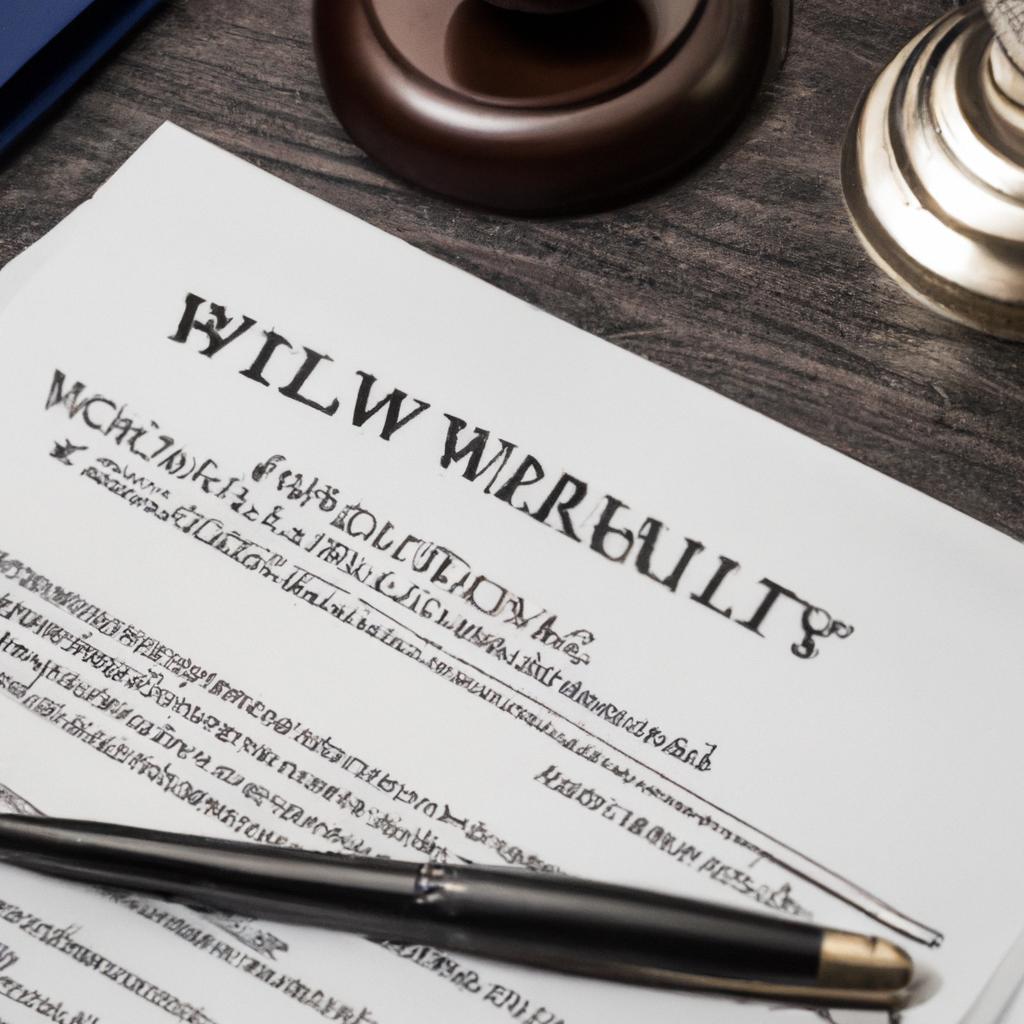As a seasoned lawyer specializing in estate planning, probate, elder law, Wills, and trusts here at Morgan Legal Group in New York City, I often encounter clients with one important question: when is the right time to file a will? The decision to prepare and file a will is a crucial step in securing the future of one’s assets and loved ones. In this article, we will explore the key factors to consider when determining the most opportune moment to draft and file a will. Join me as we navigate the intricate world of estate planning and discover the optimal timing for establishing a solid testamentary foundation.
Determining the Appropriate Time to File a Will
It is crucial to carefully consider the timing of when to file a will in order to ensure that the wishes of the deceased are carried out smoothly and efficiently. Filing a will at the appropriate time can help avoid potential disputes among heirs and beneficiaries, as well as ensure that the estate is distributed according to the wishes of the deceased.
Factors to consider when include:
- The complexity of the estate
- The potential for disputes among heirs
- The need for immediate access to assets
Additionally, consulting with an experienced estate planning attorney, such as the team at Morgan Legal Group in New York City, can provide valuable guidance on the best timing for filing a will.
| Factor | Importance |
| Complexity of the estate | High |
| Potential for disputes | Medium |
| Need for immediate access to assets | Low |

Important Considerations Before Filing a Will
Before filing a will, there are several important considerations to keep in mind to ensure that the process is smooth and legally sound. One key factor to consider is the mental capacity of the testator. It is crucial that the person creating the will is of sound mind and understands the implications of their decisions. Any doubts about their mental capacity may lead to the will being contested in court.
Another important consideration is choosing the right executor for the will. The executor is responsible for carrying out the wishes of the deceased and distributing assets according to the will. It is important to select someone who is trustworthy, competent, and willing to fulfill their duties. Additionally, it is recommended to discuss the contents of the will with family members to avoid any surprises or disputes after the testator has passed away.

The Legal Process for Filing a Will in New York
In New York, filing a will is a crucial step in ensuring that the wishes of the deceased individual are carried out in a legal and orderly manner. The legal process for filing a will involves several key steps that must be followed to ensure that the will is valid and legally binding.
First and foremost, it is important to determine the validity of the will. This includes ensuring that the will was executed properly, signed by the testator in the presence of witnesses, and meets all the legal requirements outlined in New York law. Once the validity of the will has been established, it must be filed with the Surrogate’s Court in the county where the deceased individual resided at the time of their death. Filing a will in New York involves submitting the necessary documents and paying the required filing fees. Ensure that you consult with an experienced estate planning attorney to guide you through the legal process of filing a will in New York.
Seeking Professional Guidance for Will Filing
Ensuring that your will is filed correctly and legally is crucial to protect your assets and provide for your loved ones after you pass. When determining the appropriate time to file a will, it is essential to consider various factors:
- Life changes such as marriage, divorce, or the birth of children
- Changes in financial status or acquiring new assets
- Changes in beneficiaries or family dynamics
By seeking guidance from experienced estate planning attorneys, you can navigate the complexities of filing a will with confidence. Professional attorneys can provide personalized advice and ensure that your will accurately reflects your wishes and protects your legacy.
Q&A
Q: When should you file a will?
A: You should file a will as soon as you have completed the document and had it properly witnessed and signed.
Q: Why is it important to file a will?
A: Filing a will ensures that your final wishes are legally recognized and helps to avoid potential disputes among your loved ones after your passing.
Q: Can you file a will after someone passes away?
A: No, it is crucial to file a will before the person passes away in order for it to be legally valid.
Q: Where can you file a will?
A: You can file a will with the appropriate court or legal authority in your area.
Q: What happens if you do not file a will?
A: If you do not file a will before you pass away, your assets will be distributed according to the laws of intestacy in your jurisdiction.
Concluding Remarks
In conclusion, knowing when to file a will is an important part of the estate planning process. By ensuring that your wishes are properly documented and filed in a timely manner, you can provide peace of mind for your loved ones and ensure that your legacy is carried out according to your wishes. Remember to regularly review and update your will to reflect any changes in your personal circumstances or assets. By taking these steps, you can help ensure a smooth transition of your estate and provide clarity for your loved ones during a difficult time. Thank you for reading and may you have a secure and well-planned future.
 Filing a will is an essential part of estate planning that often gets overlooked or neglected by many individuals. We are all well aware of the importance of creating a will, but when it comes to actually filing it, things can get a bit confusing. Questions like when to file a will, where to file it, and who needs to be notified can arise. In this comprehensive guide, we will answer all these questions and provide valuable insights on when to file a will and why it is crucial to do so.
Filing a will is an essential part of estate planning that often gets overlooked or neglected by many individuals. We are all well aware of the importance of creating a will, but when it comes to actually filing it, things can get a bit confusing. Questions like when to file a will, where to file it, and who needs to be notified can arise. In this comprehensive guide, we will answer all these questions and provide valuable insights on when to file a will and why it is crucial to do so.
First and foremost, let us understand what a will is. A will is a legal document that outlines your wishes and instructions for the distribution of your assets after your death. It also appoints an executor to oversee the distribution process and names guardians for any minor children. Without a will, your assets will be distributed according to the laws of your state, which might not align with your wishes.
Now that we have an understanding of what a will is, let’s dive into when to file a will. The short answer is: as soon as possible. It is never too early to create a will, but it can be too late. Ideally, a will should be created as soon as you have assets to pass on or dependents in your care. It is crucial to have a will in place to avoid uncertainty and potential complications for your loved ones.
But creating a will is not enough; it also needs to be filed with the appropriate authorities. In most cases, this means filing it with the probate court in the county where you reside. However, there are exceptions to this. If you own property in another state, you may also need to file a will there. It is best to consult with a legal professional to determine the specific requirements for your situation.
It is also essential to note that even if you have a living trust, you still need to file a will. The will acts as a backup plan in case any assets are not included in the trust or if the trust is deemed invalid. Additionally, you can use a will to leave specific personal belongings to individuals, which cannot be done through a living trust.
When filing a will, it is crucial to ensure that it meets all legal requirements. These include being of sound mind and at least 18 years of age, having it signed in front of witnesses who are not beneficiaries, and including a list of all assets and their intended recipients. Including these essential elements will help avoid any potential challenges to its validity.
Another important aspect to consider is reviewing and updating your will periodically. Life events such as marriage, divorce, or the birth of a child can impact your wishes and necessitate changes to your will. It is recommended to review your will every three to five years or whenever a significant life event occurs.
Now that we have covered when to file a will let’s discuss why it is so crucial to have a will in the first place. The biggest benefit of having a will is that it allows you to decide how your assets will be distributed after your death. This ensures that your loved ones are taken care of according to your wishes. It also helps in preventing potential disputes among family members, which can often arise in the absence of a will.
Additionally, a will allows you to have control over who will take care of your minor children in case of your death. This avoids the possibility of your children being placed in foster care or being raised by someone you would not have chosen.
Moreover, filing a will can also help minimize the tax burden on your estate and your beneficiaries. Proper estate planning can help reduce estate taxes and avoid the probate process, which can be time-consuming and costly.
In conclusion, while creating a will is crucial, it is equally important to file it in a timely and appropriate manner. Filing a will provides peace of mind and ensures that your wishes are carried out after your passing. Make sure to consult with a legal professional to ensure that your will meets all legal requirements and to review and update it as needed. Do not delay; the time to file a will is now. Your loved ones and their future will thank you.

